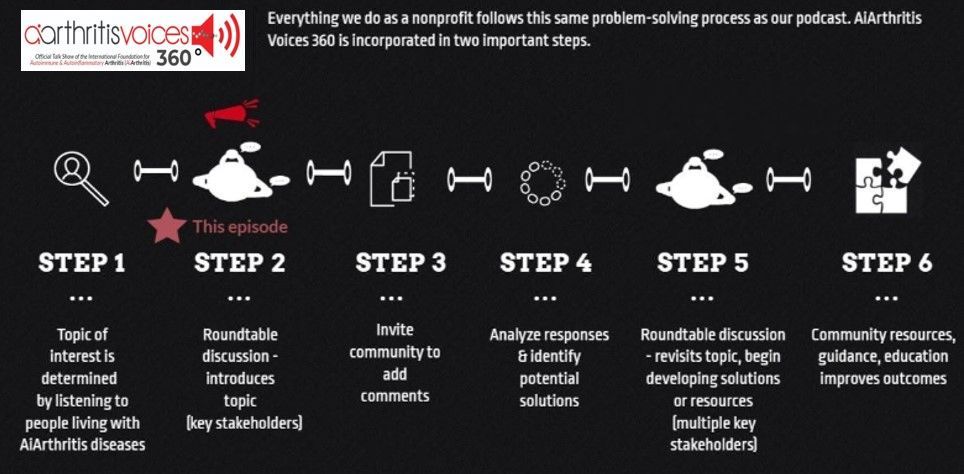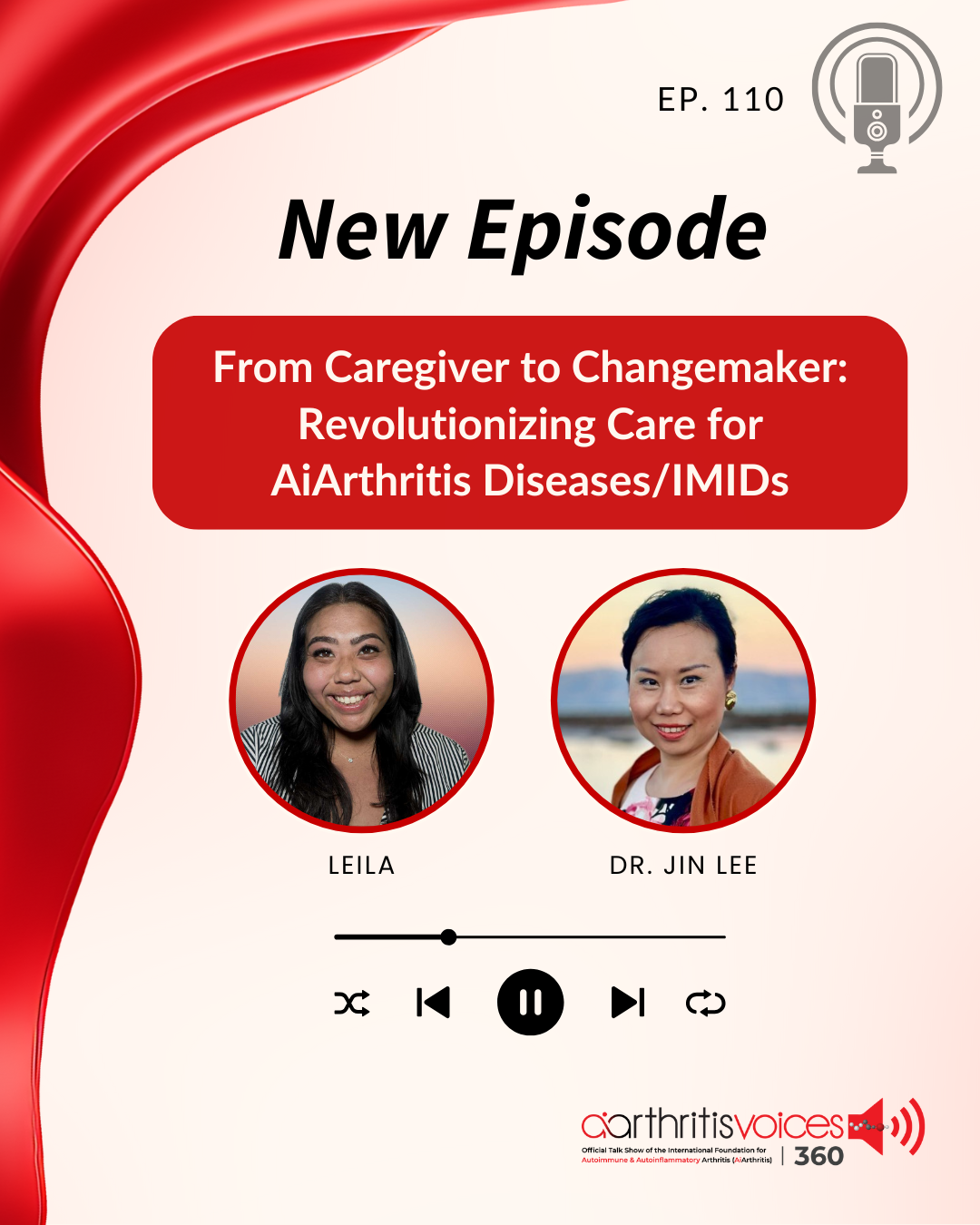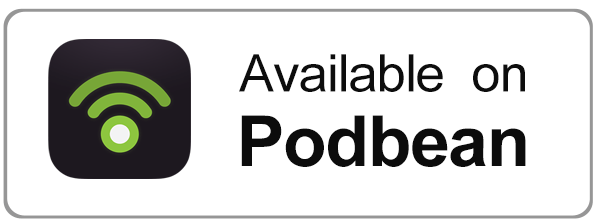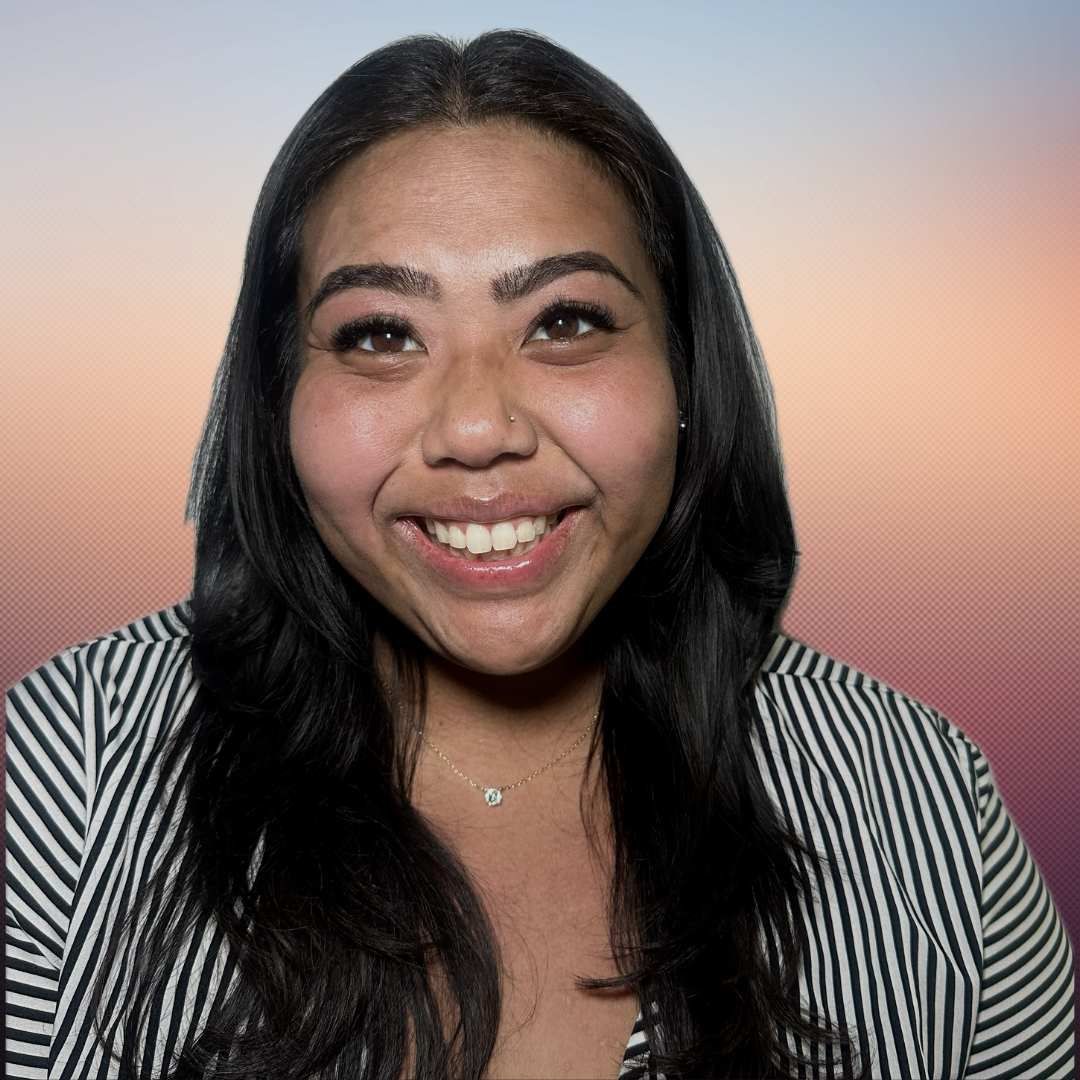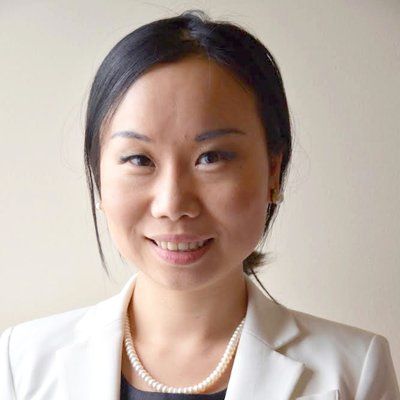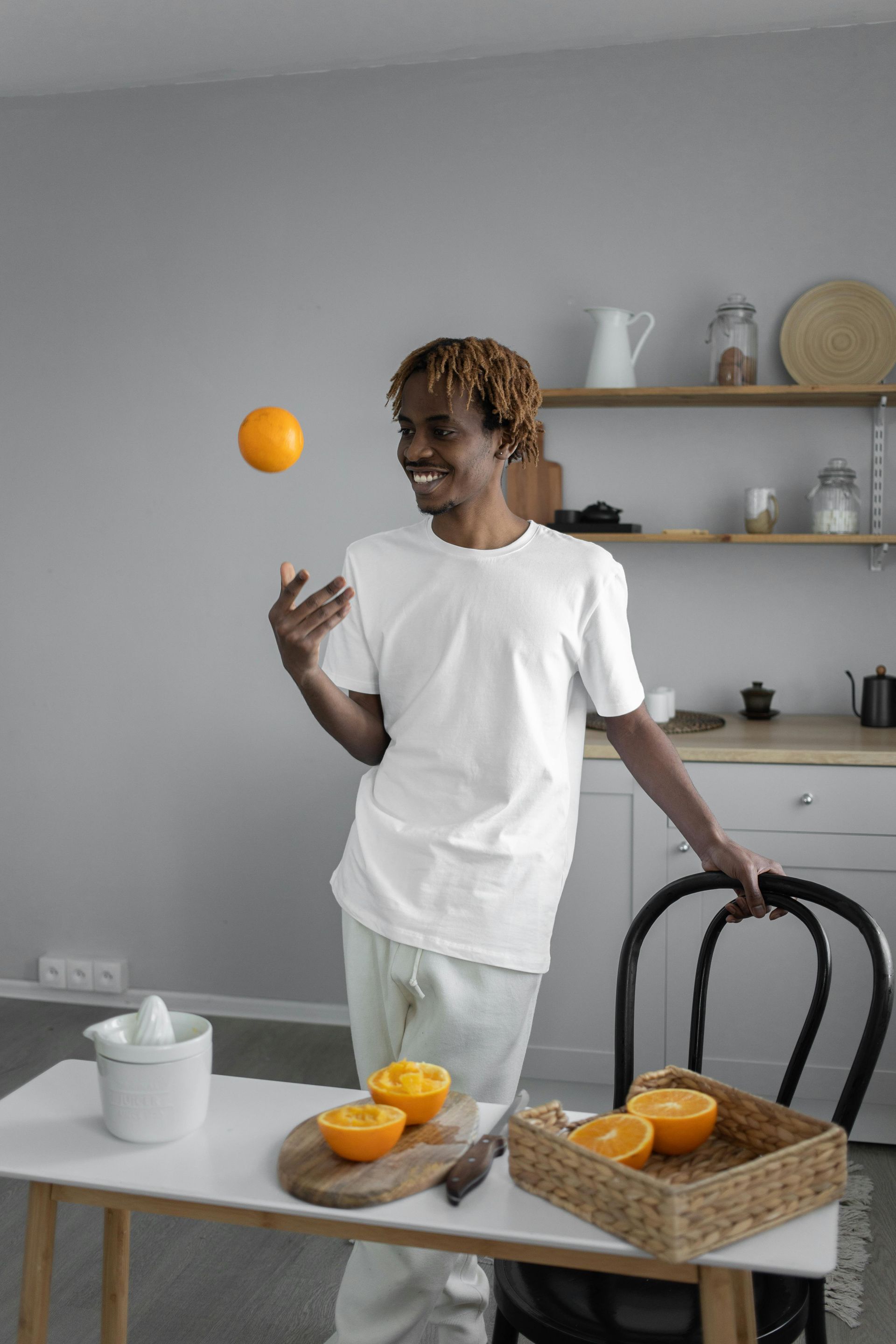AiA EP 110
===
intro: [00:00:00] Welcome to AiArthritis Voices 360, the podcast solving today's most pressing issues in the AiArthritis community. We invite you all to the table, where together we face the daily challenges of autoimmune and autoinflammatory arthritis. Join our fellow patient co-hosts as they lead discussions in the patient community, as well as consult with stakeholders worldwide to solve the problems that matter most. Whether you are a loved one, a professional working in the field, or a person diagnosed with an AiArthritis disease, this podcast is for you. So pull up a chair and take a seat at the table.
Leila: Hello and welcome to AiArthritis Voices 360. This is the official talk show for the International Foundation for Autoimmune and Autoinflammatory Arthritis, or AiArthritis for short.
My name is Leila and I am your [00:01:00] host Today. I'm a person living with Lupus and Sjogren's Disease, and I am the health education manager here at AiArthritis. I have a special guest with me here today. The CEO and co-founder of e meteorology, virtual and in-person clinic specialized in diagnosing and treating patients with immune mediated inflammatory diseases such as spondyloarthritis, lupus and Crohn's and their team of rheumatologists, gastroenterologists, pain management, doctors and health coaches work closely together to deliver the right diagnosis to the right patient with the right treatment plan. And we want to give a warm welcome to Dr. Jin Lee and please tell everybody a little bit more about yourself.
Dr. Jin Lee: Yeah, thank you so much for the intro Leila. So my name is Jin. I started off with a PhD in neuropsychology. University of Oxford in England have done work in health insurance. So Humana, fourth largest health insurance company, [00:02:00] province, and Joseph Health, which is the third largest I believe they're little bit lower now.
Top 10, let's say national nonprofit hospital system. And they're headquartered in Seattle. They manage have hospitals and outpatient care clinics in, I believe six states now. And then I've also done work in innovation and venture side for Astellas Pharma and their top three pharma in Japan. So I've done significant amount of work in payer provider pharma. I tell people that because of it. I know a little bit about why our US healthcare is a little, little not there. In terms of outcomes, especially for patients with auto inflammatory conditions,
Leila: I. Absolutely. And today we're gonna be talking a little bit more about the virtual rheumatology side and kind of how you started your clinic, as well as a little bit about chronic pain.
And so today our episode is going to be a step [00:03:00] two in our six step decision making process, which basically means we're brinJing a new topic to the table. We've never talked about virtual rheumatology clinics on our talk shows, so I think that'll be really awesome because we talk about how convenient and important remote and virtual environments have been for chronic illness patients like AiArthritis patients and people who have immune mediated diseases. They're, you know, they overlap. They're kind of like very similar categories. But yeah. So this is gonna be one of the first times we talk a little bit more about like chronic pain studies and things like that as well.
So I'm super excited to dive in, but I wanna know a little bit more about why you started in immunology. And kind of what led you to that decision?
Dr. Jin Lee: I started this because of my own husband. It took him 12 different specialists and eight years to figure out what has been going on with his pain. And this is the time [00:04:00] where, you know, I was still working.
It started out when I was still working at the hospital system. I was three levels below the CEO, so I knew who's who, and yet it took him eight years. We saw multiple primary care doctors. We saw multiple pneumologists. We saw multiple chiropractor acupuncturists started out with a simple back pain.
Then it got so bad that he couldn't walk up the stairs. He had difficulty getting off bed and sometimes not even able to turn his head. So unfortunately I was the one who thought it was ankylosing spinal before any of his doctors did. And I was the one who urged him to go see a rheumatologist after he'd been seeing a lot of primary care and allied physicians and there, there were multiple discussions from three different rheumatologists on
what specific condition it was. And then finally, we were so blessed to see a doctor ese in Seattle, who's now also one of our lead [00:05:00] rheumatologists at immunology, who finally diagnosed him with ankylosing spondylitis, which is all inflammatory arthritis condition that impacts the spine. Eventually the prognosis is the spine will become fu into what's called bone boost spine.
So it gets very dangerous if it's not taken care of already.
Leila: Absolutely. And so he does have ankylosing spondylitis, the one that shows up on x-rays.
Dr. Jin Lee: That's right.
Leila: And, and part of the, wow, that's, it's crazy that they could, that they didn't have, you know, see that a lot earlier.
Dr. Jin Lee: Yeah. Part of the reason why they couldn't diagnose him earlier, because it, on average, it takes about four years to see change in the spine, in the MRI or x-ray, so he went through eight years to finally get a diagnosis to finally say, oh my God, I think there is grosses in one part of his spine in combination with his treatment response to a biologic that he was on that's when the diagnosis becomes more clear.
Leila: Wow, [00:06:00] that's crazy.
I think like one of the biggest things at AiArthritis that we are focused on right now is our mystery patient guide and our project that's helping to expedite diagnosis and detection and treatment for patients. And so I would love to even maybe get your opinion or your husband's opinion on our mystery patient guide.
So any like, you know, input that you guys have on of any other tips that we can give to those that are looking for a diagnosis, and of course, you know, maybe even funneling them to you once we, you know, if they're able to you know, in the, in the state or in the places that you're able to practice for in immunology.
But why don't you talk a little bit more about how, you know, getting started with immunology. How long ago did you, did you guys open and, and. How did you fuse your personal experience with your professional experience in the healthcare system to kind of create this hybrid system?
Dr. Jin Lee: Right. Yeah. Thanks for the prompt.
As you can imagine, because it took my husband so long to get diagnosed, I was a [00:07:00] little let's just say not happy with the entire system. So I figured there's a better way and through his experience, right, because we saw so many different specialties I saw and experience the importance of a multidisciplinary care clinic.
And I think that is one of the key to really get that diagnosis early because every single profession, they are experts in their own little domain. And unfortunately for ai, you know, auto inflammatory conditions, which you focus on, and same in our clinic, they span multiple specialties. We know for a fact, for example, if you have ankylosing spondylitis, you have about 20 to 40% higher chance of getting another issue in gi, which is Crohn's and colitis or dermatology, which is psoriasis or psoriatic arthritis. Right? That this is biology. This is why it really prompt us to create this virtual clinic and also in-person [00:08:00] clinics that combines Pneumatology, gi, pain 'cause a hundred percent of my patients are on some type of pain or flare as some, some course of their journey.
And then on top of that, we also saw the importance of allied professionals. So now we have registered dieticians, we have certified holistic personal trainer. We also have a mental health psychologist all there to help provide that holistic care for our patients, and as we saw from COVID, it's not enough, it's not good enough to have your neighborhood doctor.
We also need to make it a lot more accessible, which is why we start with virtual first for our patients, and then if they need to go in for endoscopy, for a knee injection and and whatnot. We also have that option in New York State. So particularly in New York we have three pneumatology and five GI clinics within our [00:09:00] network that we can send our patients to. And we also accept 20 different insurance in New York state. So making it super convenient and easy for patients to see one of our specialists and also get that holistic care that's so important.
Leila: That's amazing. I think the biggest thing for patients is that sometimes coordinating between your doctors and all of the specialists and insurance and everything like that, it's a full-time job having to wait on the phone and I'm like, how does anybody with a regular nine to five job be able to contact any of the people that you need to?
You have to like, take a few hours off just to make some phone calls, and so having everybody be under the same umbrella, under the same system really makes a big difference. And knowing for sure that they collaborate with each other because, you know, there's hospital systems like Kaiser or like, you know, with our MyCharts and things like that where they're supposed to be able to contact each other and have all of the [00:10:00] different files and everything transfer over.
But there's still so many. Issues that come about that you have to, you know,
Dr. Jin Lee: navigate through a Absolutely. And, and even within Kaiser, you know, there are different instance of EMR and in Epic which means, you know, one instance doesn't talk to another. So we, we also tech enable our clinic. And what that means is for our patients, we send our patients a wearables so they could track how they sleep, how many steps.
What's their blood pressures like? All that data gets sent to the doctor. We also have access to health coaching so patients can talk to a coach to really talk about those lifestyle changes that could really impact your diagnosis or your flares even. Or let's face it, just the maintenance of getting by day to day especially when you're under a flare.
So. You [00:11:00] know, it starts not only with really good experts, but it's also with a good process data integration, and having that holistic care team to be a quarterback so that if anything happens from, you know, minor flares to severe issues, we got your back. Like you can call us, we can see you in person. We have your data and we have the specialist for you.
Leila: Absolutely. And so just reiterating, so with the virtual and in-person options right now meteorology is only available in New York State, correct?
Dr. Jin Lee: Yeah. So in New York State, we are accepting 20 different insurance. So if any nearby states patients wanna come to New York, we could see you there in person.
But for virtual, we also, our doctors actually are licensed in multiple states. So depending what specialty you need we might be able to see you. And then lastly, for our wearable and also [00:12:00] access to, we're actually launching a chappa as well. So to making it super easy for patients to log symptoms, that's not like 1980s.
But with AI enables that you can talk to and so forth that anyone can access anywhere. And that will be coming out this fall.
Leila: That's amazing. So we'll definitely keep an eye out for that and help to promote that once it does come out, because that can be very helpful for a lot of patients. We, you know, see a lot of patients that are in rural areas and you know, telehealth
coverage over the past few years has dissipated because of everything after COVID. You know, those are all special a, you know, allowances for things to happen. And it's just so unfortunate that we hear still nowadays that patients have to drive 1, 2, 5, 10 hours to see their rheumatologists every single time that they have an issue or, you know, just a regular checkup.
And so I really do hope to see [00:13:00] this model. You know, kind of duplicated in different areas and hopefully be able to help those in those really big remote states kind of in the middle of the country that, you know, don't have as many specialists as, as we do, you know both Jin and I actually live in the Bay Area, so we have you know, I a plethora of access to all these different doctors and specialists. It's hard for us sometimes to conceptualize and think, you know, in the Midwest, in Wyoming or Montana, that, you know, there isn't a city right next door to be able to go see 10 different doctors and things like that. So I really do hope to see, you know, you're not the first clinic that we've heard of, but there you are one of the first ones that have been around for multidisciplinary specifically. You know, I think there's some integrative doctors that have gone, like the, the private concierge route that I've heard of. Like here in San Francisco, I got, when I was looking for a new doctor, I, I reached out to one and they're like, [00:14:00] yeah, we have completely open you know, we're here to talk to you.
You can text us at any time, but with a $4,000 annual fee, right? And I'm like who the heck can afford a $4000 annual fee. So I'm just like, you know, I, I hope that our, you know, overall our system gets better. So to be able to help patients, but if not, you know, helping to find some workarounds like this with virtual clinics to be more common and more accessible throughout the country.
Dr. Jin Lee: Yeah. And, and we're, we're, we really think, you know, what's the help of AI and tech and we could really have that concierge service for our patients who don't have to pay that concierge rate, right? So that's why, based on our patient's request, we decide to build that chat bot that's we're launching in this fall where anyone can track your symptoms.
The AI will tell you, give you insights, and then we'll guide you like a [00:15:00] AI coach on like minor lifestyle changes, for example. We all know sleep, nutrition exercise are super critical for patients in this domain. So that way, you know, you almost have like a mini buddy or better yet health coach that's vetted in your pocket that is connected with a credible clinic.
So in case if there's any emergencies, our doctors are able to come in and help too.
Leila: I think that it's gonna be really cool over the next five years to see how AI shapes our healthcare system. Like I've already had my doctors using AI scribing to help them take their notes and all of that. And that's really helpful for me because I get to see my aftercare summary and it has all of the things that we talked about which is, was never really the case.
Like if doctors are charting themselves, it's very shorthand, very minimal, and sometimes they even just copy and paste like the same template for, for every doctor. And so, [00:16:00] because if AI is coached by, you know, by credible, like you said, clinics and doctors who know what they're talking about, and you're able to kind of build and prompt that Ai, it can become so smart and, and be able to help, like you said, identify symptoms and.
At least, at the very least, give the doctor an accurate report of kind of what's going on with that patient so that doctors can sift through the symptoms and all of that a little bit faster and get to see patients a little bit faster as well.
Dr. Jin Lee: I think you touch upon, you know, one important aspect, which is, you know, we only see our patients once every three months.
Six months or maybe once a year, right? Depending what, how severe the, the inflammation is. But patients live with a disease 24 7, so having a very easy and accessible way to log your symptoms, track and, and a tool where it could give you insights in return. [00:17:00] It's really helpful not only for the patients, but also for the doctors, right?
To see how have you really been in, you know, in the past X months. We all know when we go to the clinic, your doctor usually asks you like, what's your pain level from scale one to 10 in the past seven days? Well, do you really like, remember what your pain level a week ago, or, you know, better yet, a month ago.
These are the things I think is super important to log. And that way it's a very objective record of, of what happened. And not only for pain, but also for like nutrition, right? Sleep data, all those are correlated. How your disease are progressing and indicators of biomarkers for, for your particular medical journey.
Leila: Absolutely. And you know, we always encourage patients like, you know, data is the biggest thing to be able to help you with your disease journey. And whether that's pictures of your rashes with timestamps so that you know when that happened. Or [00:18:00] symptom logging, just like you said, you know, your pain level per day, your mood, your sleep.
Data, data, data is what's so important not only to get a diagnosis or you know, oriJinally when that first happens, but continuing to track your progress in your disease, how your medication is working, all of that kind of stuff. And I think that is kind of a good segue leading into our next topic, talking about pain and your pain, the pain study that you all are hosting at the immunology and how the data is tracked and how you're able to use that to be able to help the patients with their pain. So if you wanna talk a little bit about that. I know that pain is one of the most common and most frustrating symptoms that patients deal with, with our, with these diseases deal with.
And so how is IMIDs kind of approaching the pain aspect of everything?
Dr. Jin Lee: Yeah. So start with a multidisciplinary care. So, so we we basically try [00:19:00] to install our sort of clinical knowledge into something that's more accessible to our patients. So that's why we're doing a pilot right now. If any listeners out there who wanna join this pilot, we're still recruiting.
It's for people age 18 and up. If you have any of these other informatory conditions such as p, rheumatoid arthritis, psoriatic arthritis, ankylosing spondylitis, lupus colitis, Crohn's please. Go to immunology.com and send us a note. For the pilot it's three months. We give you a wearable that will be shipped to your door.
The whole pilot is remote. We give you access to once a month peer support groups. You also have biweekly calls with a health coach to really digest the data That's for you. So the health coach will go through your sleep data, your your steps what's your mood been like, and give you [00:20:00] tips on things that you can do to improve.
So these tips could be as small as doing a five minute gratitude journal or go out, walk around the park for 10 minutes. So. Really easy, five to 10 minute actionable items that anyone can do within their household to see. Does all of that lifestyle change and access to a coach helps with decreasing inflammatory markers like C-reactive protein and also ESR and there in turn, does that decrease pain in patients with auto inflammatory conditions?
So we've been voting for, for a couple months now, and the initial data do indicate that patients think it's super easy to track data as well as do these daily interventions. So our engagement rates is actually pretty [00:21:00] high, and then we're still waiting for blood biomarker data to see what's the correlation between lifestyle and biomarkers there to prove that pain is not just.
Subjective, absolutely in, in the biomarkers. So that's coming out soon as well.
Leila: That's awesome. Yeah, I think like for me, with losing weight and exercising as well as really paying attention to my mental health, like for the past year I've been in consistent therapy biweekly therapy, my C-R-P-E-S-R and my compliments are all normal.
And it had never been like that my whole time having lupus. And so really, I really do think that people underestimate. The power of, you know, helping with your mental health and with your diet and exercise, like how much it really can change the outcomes of your AiArthritis or IMID disease.
Dr. Jin Lee: [00:22:00] Absolutely. And that's, that's well researched. So my PhD is in psychology. I absolutely believe the connection between mind, body. Mm-hmm. And for something like IBD especially, you know, most people didn't realize a majority of serotonin, which is neurotransmitters of how we feel is in the gut. So when people say, my gut feeling is X, Y, Z, it's real.
That's because your neurotransmitters to your brain starts from the gut, not the other way around. Obviously, you know, it's, it's bilateral, so therefore, you know, your mood really, really impacts. Same thing with stress management, your sleep your supportive network, right? Like what's your social connections are like, and.
Funny enough, you mentioned lupus. There's also a lot of studies on correlation between dental care and lupus. Oh, gosh. So, so a lot of this is lifestyle, like you say, it's, it's things within our control that we can do and help our loved ones [00:23:00] do to feel better. Because when i'm a caregiver, so when my husband feels better, my whole family feels better.
Yeah, absolutely. It's not just a per one person disease. It's, it's the whole family. Yeah.
Leila: Definitely. And I think that that's that's really important. And I think the biggest thing is you never know until you try. So I think that's the biggest thing is that people if we're already in pain, it feels so counterintuitive sometimes to get up and move your body.
And I think if you really just try and, you know, if you conceptualize, okay, moving my body means I'm moving the inflammation out of the joints and moving it. Around and thinking of it that way, it really helps to be like, okay, this is helping my body, even though I may be sore the next day. It's a different kind of pain.
It's a, it's a rewarding kind of pain compared to the aching and soreness of pain like. When you're at rest. I think that's the, the kind of way [00:24:00] that I like to describe it. And on top of that, like you said, with the neurotransmitters, the activity helps with happiness and all of your happy hormones as well too.
So lifestyle changes are super important for us to to take into consideration when talking about treatment plans in general. And like I said, with pain. It is very frustrating and there's a lot of patients that, you know, if you have RA and you like your husband, you know, you were, it took eight to 10 years to get diagnosed.
You do probably have those nodules and other parts of your joints that were deteriorating. So there is actual general mechanical pain that's going on because of the joints, not just because of the inflammation as well. So being able to properly describe your pain is super important so that your doctor can know a little bit more about what's going on.
And so I took a look at some information from the [00:25:00] NIH that had some really interesting questions and like description words for pain. And so I kind of wanted to just kinda read this to the audience and tell them a little bit about it. So. Some information when you're tracking your pain. That's helpful to include for doctors is how long you've had your pain, where specifically you feel the pain, whether your pain is in one spot or it spreads out and, and changes how the pain feels and how severe it is, whether it's constant or comes and goes.
Does activity make it worse? Or improve it. How does your pain limit what you do and how often pain occurs or anything that you've noticed that triggers the pain? So these are some prompt questions to think of when you, before you go into the doctor, right? I think that's the thing too, is that as patients sometimes we forget that we should prepare before we go into the doctor's office as well.
So asking yourself those [00:26:00] questions maybe the night before and writing the answers to them down can be very helpful to be able to make sure that you give the doctor all of the information that you want to so that they can make an educated decision on how to proceed forward on helping your pain. And the next thing is like we said, keeping a diary or a record of your pain, whether that's on an app, on an actual notebook, or through a wearable, there's a lot of ways to be able to help track those things. And sometimes people have a hard time describing their pain. So here's some description words that you can use when describing your pain, aching, cramping, gnawing, heaviness, hot or burning sharp,
shooting pain, sickening, like you're so, you're in so much pain that it makes you nauseous. Spitting, pain, stabbing. Tender, like your muscles are just tender or your joints are [00:27:00] tender or throbbing. So those are some really good description words that can help your doctor understand what may be going on.
And yeah, I just wanted to double check also with the study that you all have going on is it available to everybody in the states? Oh yes,
Dr. Jin Lee: it's, it's nationwide. So nation nationwide, who's above 18. Please give us a shout. We're trying to figure out, you know, really map the correlation between lifestyle and pain.
So please. Help science to help others.
Leila: Yes, absolutely. So we'll definitely have all of the links in the show notes for you all to check out and be able to see if this study is something that you're interested in. Mm-hmm. And another reason why Jin is here is because AiArthritis is actually partnering with a immunology for their first inaugural patient autoimmune Patient Summit is gonna be happening here in a few months. So I was super excited about it and wanted to see if you can [00:28:00] tell the audience a little bit more about what's going on in September.
Dr. Jin Lee: Yeah. So we're, because we see many patients in all inflammatory conditions who has multiple of these conditions in one person, unfortunately sometime they feel really lonely and that's part of, one of the reason why we started out with pairing with health coaches in person and also doing this AI coaching bot now, but we have gone a step further, which is to create one and a half day in-person Autoimmune Patient Summit at Mercy University in Dopps Ferry, New York, which is about a hour north of Grand Central.
It stationed in New York City. We are having multiple different type of doctors speaking to patients. So that includes GI, rheumatologists mental health specialists. We also have various patient advocates. So Lida is actually gonna be a speaker. To be there to really [00:29:00] teach others what their journey has been like and share advice.
That's more importantly. And then lastly, we are partnering this summit with major nonprofits in this space, such as Crohn's and Colitis Foundation, ai, arthritis arthritis Foundation, lupus Foundation, and so forth. So this summit is really, think of it. As a educational retreat on top of the educations, we're also trying to making it fun.
So we are inviting patients to self nominate or nominate others for patient awards. And best athlete, best advocate. These nominations open right now, so please do go to our immunology.com slash summit webpage to submit your nomination. And then secondly, we're also doing a patient talent show.
So we really, we know that you are more than your diseases or your symptoms. Many of the patients have other [00:30:00] talents such as Leila, I believe you're gonna sing for us. So we also gonna have dancers. We have somebody who's running a fashion show. It's gonna be a night of really fun and appreciation to what's like, what's really like to be an all immune patient.
Then lastly, we're also giving out a lot of raffles as our way to fundraise for all these nonprofits who's partnering with us in holding up this summit. So please do come. The rates goes up on July 1st, so please do register, tell other people about it. It's gonna be one and a half day July 13th to 14th over the weekend.
Really fun, educational and. Empowerment event for everyone who's going through other meal.
Leila: That is super exciting. I've actually never been to New York, so this is gonna be a really cool time. I'm actually gonna bring my husband with me too, so we can you know, take a few days and, and hang out in New York after.
[00:31:00] So this is a really cool way to to get all the different patients together and unite all of the different patient organizations as well that are helping to sponsor and, and put together and, and, and advertise the Autoimmune Summit. And I know that, you know, you mentioned the that it'll be educational and about empowerment.
So I know that there's gonna be different panels and different workshops that patients can attend and kind of learn more about their diseases and about pain and inflammation and things like that as well. So not only will it be, you know, educational, but it'll be fun and a lot of networking and getting to know patients as well.
So yeah, super excited. We'll, again, set up. The link in, in the description for you to be able to sign up if you're gonna be, you know, if you're accessible to the New York area. In that middle of September, it'll be a really fun event for all of [00:32:00] us to see each other in person and get together and have that interaction that sometimes autoimmune patients, we, we don't get too much of every, you know, because we're always, you know, worried about getting sick.
So there's mm-hmm. There's that. So this has been a really great conversation for us and thank you, Jin, for coming on the show today. I really appreciate it.
Dr. Jin Lee: Thank you for having me. Yeah, so I, I think, I think this, just to wrap up on the summit topic, you know, we're announcing the the launch of chat bot there.
We're gonna disclose what the study results been like for the pain study you by changing lifestyle interventions. And then lastly, we're actually also writing a book, a handbook for autoimmune patients. So. I've, I've been there with my husband where when he first got diagnosed, he we were all at loss and worried, anxious.
We're trying to make this handbook super easy to [00:33:00] read so that every patient who's newly diagnosed or have been diagnosed for years and looking for new information this will be a great way to learn about the latest drug development. These lifestyle interventions that you can do at home. We're gonna include many real interviews and life experiences, so do watch out for the book launch as well at the summit.
And so it's gonna be really educational, fun, and then coupled with these important announcements that you'll see later on this fall.
Leila: Awesome. Well, thank you so much again for all the information and for really being an advocate and you know, someone to help push forward the autoimmune space.
Sometimes it gets really hard to have people invested in the rheumatology space and so, it's really great to see people come in and, and wanting to help patients to the level that you are. So I commend you and all of your staff on an [00:34:00] amazing clinic that you guys have going and events and, and getting involved in the community.
Being connected with the patient organizations is something that. I see that needs to happen a lot more when it comes to rheumatology offices and all of the other specialty offices. There's a disconnect there where the education isn't being given to patients. So having such a close relationship with patient organizations really can help patients to feel comfortable with, you know, moving over to those patient organizations and getting to know their community so that they can have an even bigger.
Community of support to be able to get through the day to day of these unfortunate diseases that we all live with, you know?
Dr. Jin Lee: Yeah. And, and thank you for everything. You, you guys are doing it Truly do take a village because unfortunately it is a chronic illness. I tell folks, right? Like even with these biologics and, and, and lifestyle changes, it's, it's a new [00:35:00] identity for patients.
It's, it is a new way of living that we have to cope day in, day out. But I think with, with a village and supportive groups like you and, and our doctors we can hopefully make a difference and help some patients to make it easier to get by.
Leila: Absolutely. And before we wrap up, if you want to go ahead and let everybody know where they can find e imideology on social media and be able to follow in your website.
Dr. Jin Lee: Yeah, so it, or just at imideollogy.com. That's I-M-I-D-E-O-L-L-G y.com. And then from there, please go to our bottom of our page, follow our TikTok, our Instagram. We're pretty active there. As mentioned we're also launching few important things. So book the chat bot this fall as well as sign up for our summit before the rates increase this July.
So thank you so much for having me, Leila.
Leila: Of course. And on the AiArthritis side, look out [00:36:00] for. Go with us to conferences program, and we are going to Eular June 11th to 14th and it is in Barcelona, Spain. So I and three other members of our team will be heading out to Spain very soon. So go to AiArthritis.org/conferences to come with us.
To the conference. When you go with us to conferences, there's two different levels. We have the regular level where you get an email every day of the conference that has debrief videos of the different sessions that we go to, as well as text summaries of those videos for you to get the bullet points of the hot topics that we are covering during those videos.
Or you have access to an elevated experience. This year is a WhatsApp group chat where you can live ask us any questions that you may have about the sessions that we're going to or about the different people that we're meeting and get more behind the scenes of what's going on during those [00:37:00] conferences.
So every year we go to a CR in November and Eular in June. Or actually ACR is in October this year, but. This is one of our biggest programs that a lot of people say that they learn a lot during because we are talking about the breaking research that's coming out twice a year. So even if you don't have time to be in the elevated experience, if you wanna leisurely watch these videos in, in the future, please sign up.
This year we're gonna be also partnering with different patient organizations that are European based and Latin America based, for them to be able to help us give some insight on these sessions in different languages as well. So that'll be awesome. And anything else before I wrap it up with our outro?
Dr. Jin Lee: We're gonna see you in a CR. So yes, I'll see two of us together there.
Leila: Yeah, absolutely. So at AiArthritis, we don't just represent the patient voice, we are the patient voice. And with your [00:38:00] support, we can amplify it even further. If you've found value in this talk show, consider making a donation to help us continue producing impactful conversations, bringing all stakeholders to the table to discuss patient identified issues and patient infused solutions Visit.
AiArthritis.org/donate to help us make a difference together. And thank you again for tuning into this episode of AiArthritis Voices 360. You can find AiArthritis on all major social media platforms at IF AiArthritis, and that's a wrap. We'll see you here next month for the next episode of AiArthritis Voices 360.
Thank you.
Dr. Jin Lee: Thank you,
intro: AiArthritis Voices 360 is produced by the International Foundation for Autoimmune and Autoinflammatory Arthritis. Find us on the web@www.AiArthritis.org. Also, be sure to subscribe to this podcast and stay up. [00:39:00] Today on all the latest AI, arthritis news and events.
